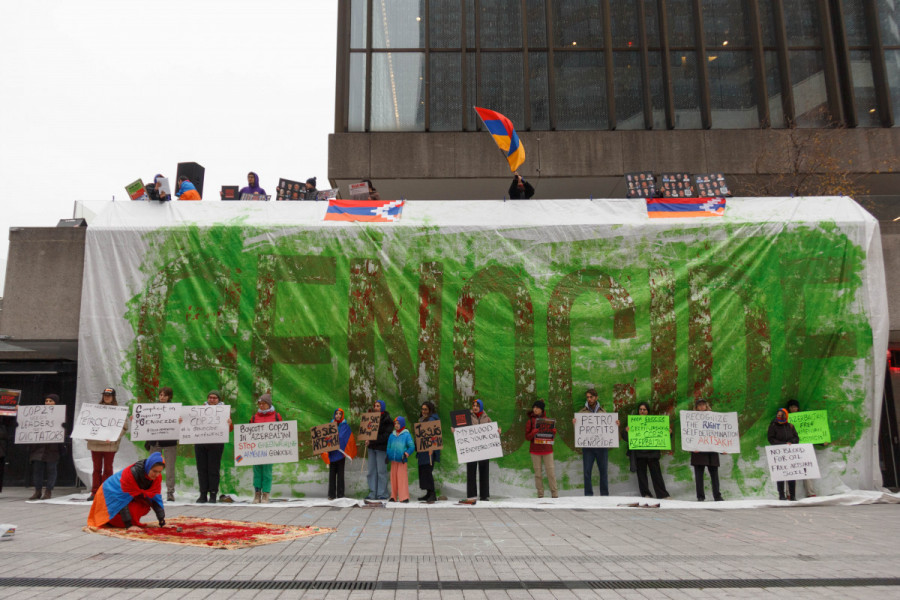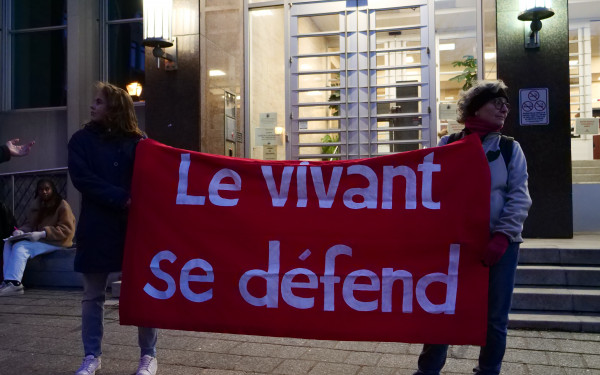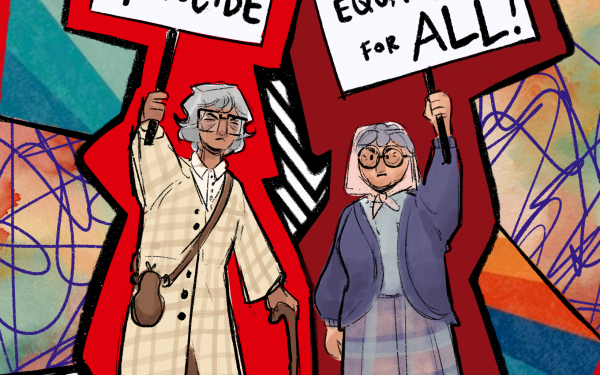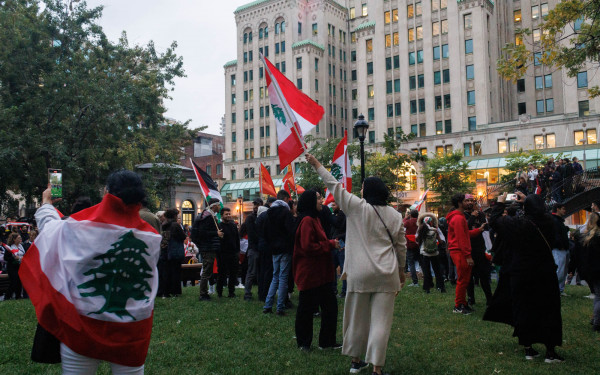COP29 protesters denounce the Azeri petrostate dictatorship
Protesters condemn COP29 host Azerbaijan’s greenwashing of humanitarian crimes
Dozens of protesters adorned in the colours of the Armenian flag gathered in Place des Arts on Nov. 10, a day before the start of the UN climate conference (COP29) being hosted in Baku, Azerbaijan.
The protesters stood in front of a massive banner labelled “Genocide,” chanting “No blood! No oil! Free Artsakh soil!”
Alongside the environmental group Last Generation Canada, the protest was organized by the Armenian Youth Federation and the Aghmoog Collective, a grassroots artistic and political group.
Over 40,000 politicians, journalists, lobbyists and other COP29 participants have flocked to Baku to contribute to the development of new international policies addressing climate change. This year’s conference is focused on climate finance and on issues relating to increasing funding for lower-income countries transitioning to zero-carbon economies.
But the decision to host the conference in Azerbaijan, a country that many consider an authoritarian petrostate, has been heavily criticized by many, including Montreal protesters standing in solidarity with the Armenian people.
“I find it hypocritical that there is an environmental conference determining the future of the human species being held in a country that obliterated my people out of our ancestral land,” protest organizer Yon Nersessian said. “It’s where we’ve been living for over 3,000 years.”
Like many of the other Place des Arts protestors, Nersessian is a descendant of Armenian genocide survivors. His family has roots in Nagorno-Karabakh, an ethnically-Armenian region that is recognized internationally as an Azerbaijan province, but considered independent by Armenians. Armenians claimed the area as the Republic of Artsakh after the collapse of the Soviet Union and the following bloodshed and displacement it caused.
In 2020, Azerbaijan troops violently seized Nagorno-Karabakh. The area was blockaded, and Azeri troops led brutal attacks, with tactics including beheadings, torture and internationally sanctioned use of phosphorus bombs on civilians.
As a result, in 2024, the near entirety of the 120,000 indigenous Armenian population have fled the region or been executed. Experts describe this ethnic cleansing as genocide or a crime against humanity. Azerbaijan has denied these claims, citing a need to defend against fundamentalist Armenian Christian fascists.
“Azerbaijan’s goal is to erase Armenia,” said Lucy Dadayan, another protester at Place des Arts. “We are fearful but we have no choice, so we have to organize.”
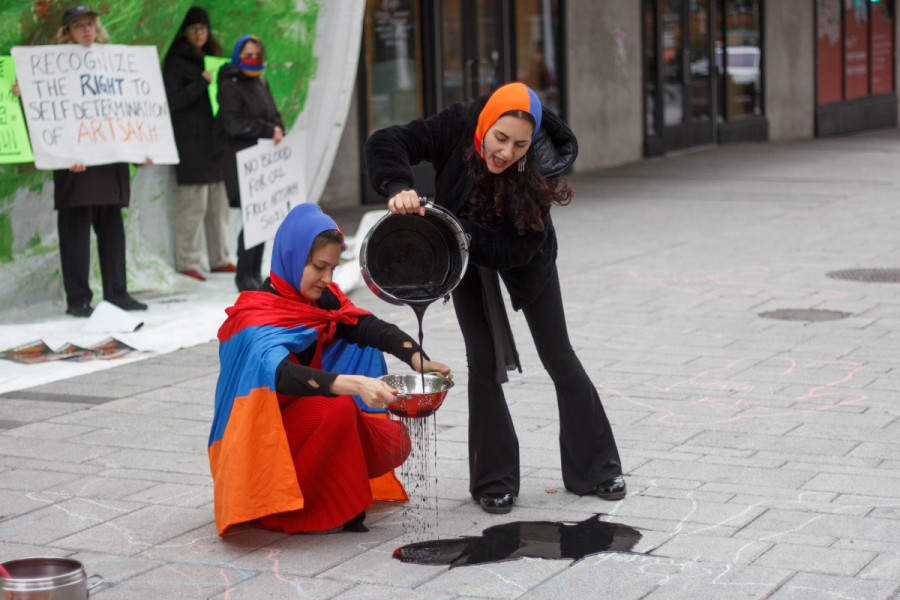
Azerbaijan has received few international repercussions for its war crimes. With over 90 per cent of Azerbaijan’s exports linked to oil and gas, the country’s economy is built on fossil fuels. Politically affluent countries such as Germany and Italy fear jeopardizing their own futures and energy goals by denouncing the ongoing humanitarian and ecological violence in Azerbaijan.
In contradiction to the Paris Agreement on climate change, Azerbaijan plans to expand its fossil fuel production over the next few years. Mukhtar Babayev, COP29 president, was also on the executive board of the State Oil Company of the Republic of Azerbaijan for 25 years. In the now ethnically-cleansed area of Nagorno-Karabakh, Azerbaijan plans to build a “Green Energy Zone”.
With this Green Energy Zone and the hosting of COP29, critics say that Azerbaijan benefits from “greenwashing,” a performative, environmentally-focused media campaign that conceals the country’s crimes against humanity and the environment.
In Montreal, Nersessian, Dadayan and the rest of their allies are imploring onlookers not to be fooled by this campaign.
“We reached out to all the environmental organizations in Canada and Last Generation was the only one that kind of responded to us,” protester and organizer Marie Khediguian said. “Some [groups] responded, but not in an official capacity, because they are sending delegations and do not want to endanger those delegations. It was a lot of politics.”
Khediguian, whose four grandparents all survived the Armenian genocide, thinks it’s important not to let history repeat itself.
“I see what happens when people are expelled from a land and their home for so long, and don’t want to sit by and let it happen again,” Khediguian said. “I made a promise to my grandparents that I wouldn’t.”
Above all, protesters such as Khediguian, Dadayan and Nersessian hope to improve their cause’s visibility, which they feel has been overlooked by both Canadian environmental groups and everyday people.
“I’m not sure the [average] person knows what the COP29 is, what the country of Azerbaijan is, that they’re a dictatorship, that they have one of the lowest scores for journalistic freedom, that their human rights are so low, and that people who are going to these UN climate summits are being told not to talk about indigenous Armenians who they just expelled,” Khediguian said. “I want people to understand what’s happening. The average person would think what’s happening is not right if they knew about it. ”
“Our fight is a collective fight—if you’re fighting for [anyone’s] indigenous rights, you have to see it as a global issue,” Nersessian said. “Imperialism is not only where the camera is, it’s beyond that. Even if genocide or imperialism isn’t televised, it doesn’t mean that it doesn’t exist.”

